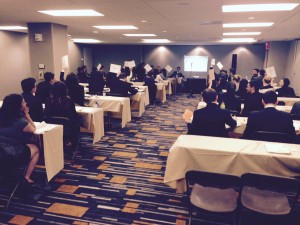Dissent and Disillusionment: Tensions Run High in the European Union
By JOHN SUNUNU, AGENCE FRANCE-PRESSE
Although continental Europe maintains a reputation on the international stage for its polished bureaucrats and poised diplomatic corps, this finesse was not inherently evident during the first meeting of the European Union committee at the sixty-first session of the Harvard National Model United Nations Conference in Boston, Massachusetts. Reporters from Agence France-Presse were able to monitor the delegates in this committee throughout the first session and conduct a series of brief, personal, on-the-record interviews that will provide our readers with an up-close and personal look into the back-room wheeling and dealing of European politics. We found a number of surprising themes: cries for structural reform from already-powerful states like France, support for continued austerity measures from beleaguered countries like Cyprus, and two emerging immigration plans that threaten to tear the committee into two blocs. Agence France-Presse delves into the territorial jealousy and financial worry that in large part characterize the European Union today.
Germany, ever the voice of contention within the body, opened formal discussion with a fiery tirade condemning the “unsustainable monetary policy” of the European Union of years past. Unsurprisingly, Germany was quick to shame a number of fiscally irresponsible European Union member states, calling their presence a “blight” on the future of the continent. Austria, a member of this growing Germanophone power bloc, echoed these sentiments, urging the committee to undertake a program of “structural reform” that would bring all member states into financial health.
As debate progressed, our reporters noticed a clear division of opinion beginning to form in the room over the future of austerity measures. These regulations, which date to August 2008, are among the most controversial pieces of legislation implemented by the European Union over the last decade. Greece, one of the nation-states most affected by the austerity guidelines, lambasted the initiative as a “program designed to cripple the poor and the weak of Europe” that would “suck the coffers of Eastern Europe dry to benefit the covetous West.” Our reporters at Agence France-Presse corroborated many of these claims: most shockingly, European Union law now mandates that all member states maintain federal budget deficits of no more than 3 percent of gross domestic product, a target that even wealthy states such as France are unable to meet.
Despite these disagreements in values, the representatives to the European Union committee stressed their commitment to the political, religious, and linguistic diversity of the European continent. While the European Union has three official languages of communication — English, French, and German, which are the three most spoken languages on the continent in terms of combined first and second language speakers — a number of unique languages were used on the committee floor. The representative from Spain interjected phrases in Catalan throughout his discourse on border security while the delegate from Finland regaled the room with a closing sentiment in Finnish. Given this diversity in language and communication, reporters from Agence France-Presse found the degree of xenophobia and anti-immigrant sentiment shocking. Germany, home to more than five million Turkish guest workers, or Gastarbeiter, summed up the viewpoint of many immigrant-rich European states. In their opinion, “Europe must be seen [by immigrants] as an opportunity and a land of fortune” whereas it frequently is not. Spain echoed these sentiments, criticizing the Schengen Agreement open-border policy enacted in the European Union in 1995 that eliminated formal border crossing checkpoints. Sweden, represented by a single delegate, expressed a more hopeful to Agence France-Presse. “Although we may be a continent separated by our unique cultures, it is precisely these same cultural differences that could allow Europe and all those citizens that it welcomes to grow together in greatness.”
The delegates, along with the rest of the European Union committee, can be found in the Arlington Meeting Room on the fourth floor of the Marriott Copley Place Hotel.




Recent Comments